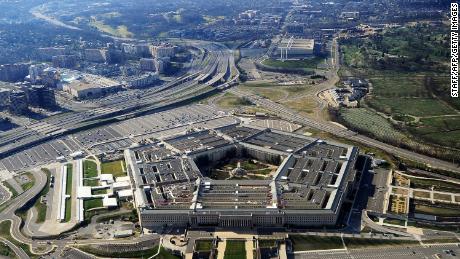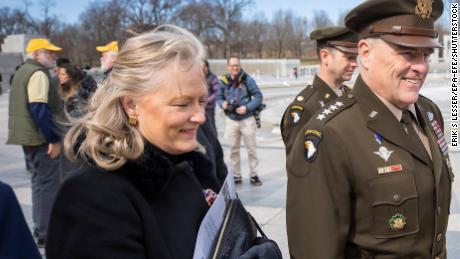US military commanders anticipate that the President will begin the withdrawal before he leaves office
The Pentagon has issued a notice to commanders known as a “warning order” to begin planning to drawdown the number of troops in Afghanistan to 2,500 troops and 2,500 in Iraq by Jan 15, the officials said. Currently there are approximately 4,500 US troops in Afghanistan and 3,000 troops in Iraq.
The Pentagon and White House did not immediately respond to CNN’s request for comment.
While Monday’s news indicates that the Pentagon appears ready to remove thousands more US troops from Afghanistan and Iraq, it also suggests that Trump may fall short of fulfilling one of his core promises to withdraw all US troops from Afghanistan before he leaves office.
On October 7 Trump tweeted: “We should have the small remaining number of our BRAVE Men and Women serving in Afghanistan home by Christmas!”
Republican Senate Majority Leader Mitch McConnell did not criticize Trump directly Monday while discussing the drawdown plans but warned of the potential ramifications of a rapid withdrawal of US forces from Afghanistan, saying it would “hurt our allies.”
“We’re playing a limited — limited — but important role in defending American national security and American interests against terrorists who would like nothing more than for the most powerful force for good in the world to simply pick up our ball and go home,” he said in a speech from the Senate floor.
“There’s no American who does not wish the war in Afghanistan against terrorists and their enablers had already been conclusively won,” he said. “But that does not change the actual choice before us now. A rapid withdrawal of US forces from Afghanistan now would hurt our allies and delight — delight — the people who wish us harm.”
The US commander in the Middle East announced a drawdown of US troops in Iraq from 5,200 to 3,000 in September.
In March, US forces began pulling back from bases across Iraq, turning them over to Iraqi security partners. At the time, Pentagon officials insisted that the base hand-offs were part of a long-planned consolidation that reflected the success of the anti-ISIS fight — not concerns over the ongoing rocket attacks by Iran-linked proxy militias.
Sweeping changes at the Pentagon
US military officials have long stressed that the US withdrawal from Afghanistan should be conditions based, including the Taliban breaking its ties to al Qaeda and making progress in peace talks with the Afghan government, two conditions that have yet to be met.
But despite the lack of progress, the Trump administration has already substantially reduced US troops in the country by more than 50%, recently bringing the number of US military personnel there down to about 4,500, the lowest levels since the earliest days of the post 9/11 campaign.
Trump made bringing American troops home a theme of his reelection campaign but the future of US forces in Afghanistan has remained uncertain amid the mixed messages coming from the administration.
National security adviser Robert O’Brien has advocated for a more accelerated withdrawal from Afghanistan irrespective of conditions on the ground, something made more feasible by the installation of White House loyalists in senior defense posts.
Chairman of the Joint Chiefs of Staff Mark Milley had pushed back on an earlier announcement from O’Brien suggesting an aggressive timeline for troop withdrawals that appeared to be irrespective of conditions.
“Robert O’Brien, or anyone else, can speculate as they see fit, I am not going to engage in speculation, I’m going to engage in the rigorous analysis of the situation based on the conditions and the plans that I’m aware of in my conversations with the President,” Milley told NPR on October 11.
Those changes included installing an ardent opponent of the US military’s presence in Afghanistan, who once called for the use of lethal force against illegal immigrants and has made a litany of racist comments, as a senior adviser at the Pentagon.
A Pentagon spokesman confirmed Wednesday that retired Army Col. Douglas Macgregor “will be serving as a Senior Advisor to the Acting Secretary of Defense. Mr. MacGregor’s decades of military experience will be used to assist in the continued implementation of the President’s national security priorities.”
Macgregor has been a vocal opponent of the US military’s mission in Afghanistan and has called for a total withdrawal of US troops and the American Embassy despite the continued presence of terrorist groups there.
Republican Sen. Rand Paul of Kentucky who is a strong advocate of withdrawing US troops welcomed the appointment.
“I am very pleased @realDonaldTrump asked my friend Col. Doug Macgregor to help quickly end the war in Afghanistan. This and other picks for Pentagon are about getting the right people who will finally help him stop our endless wars,” Paul tweeted.
Trump also fired Defense Secretary Mark Esper last week in a tweet, replacing him with Christopher Miller, the director of the National Counterterrorism Center.
In one of his first moves as acting Defense Secretary, Miller sent a seemingly contradictory message to the force on Friday, saying the US must continue its battle against al Qaeda and the terrorist forces behind 9/11 while also saying it was time to bring troops home.
“This war isn’t over,” Miller wrote in his message. “We are on the verge of defeating al Qaida and it’s associates, but we must avoid our past strategic error of failing to see the fight through to the finish.”
“Indeed, this fight has been long, our sacrifices have been enormous, and many are weary of war — I’m one of them — but this is the critical phase in which we transition our efforts from a leadership to supporting role,” he wrote in reference to the current US role of supporting counterterrorism campaigns such as the one in Afghanistan.
“All wars must end. Ending wars requires compromise and partnership. We met the challenge; we gave it our all. Now, it’s time to come home,” Miller added.
State Department officials unaware of Pentagon order
O’Brien and US Special Representative for Afghanistan Reconciliation Ambassador Zalmay Khalilzad are expected to discuss the troop drawdown plans during a meeting Monday, two State Department officials told CNN.
Khalilizad recently returned to Washington from a trip to Turkey where he met with Turkish Foreign Minister Mevlüt Çavuşoğlu and other Turkish officials. They discussed mutual concerns about the levels of violence in Afghanistan, according to a readout from the State Department.
State Department officials knew it was possible Trump could order an additional troop drawdown in Afghanistan but did not know that the Pentagon had sent this warning order, two State Department officials said.
Some State Department officials believed that because Trump did not order further troop withdraws before the election it was unlikely that there would be more during the rest of his administration.
But last month Khalilizad said the conditions will dictate further withdrawals.
“If conditions are right, we are committed to withdrawing. But if the conditions are not right, we don’t have to withdraw,” Khalilizad said in an NPR interview at the time.
This story has been updated with additional reporting Monday.
CNN’s Kylie Atwood, Vivian Salama, Alex Rogers and Ryan Browne contributed to this report.
![]()






